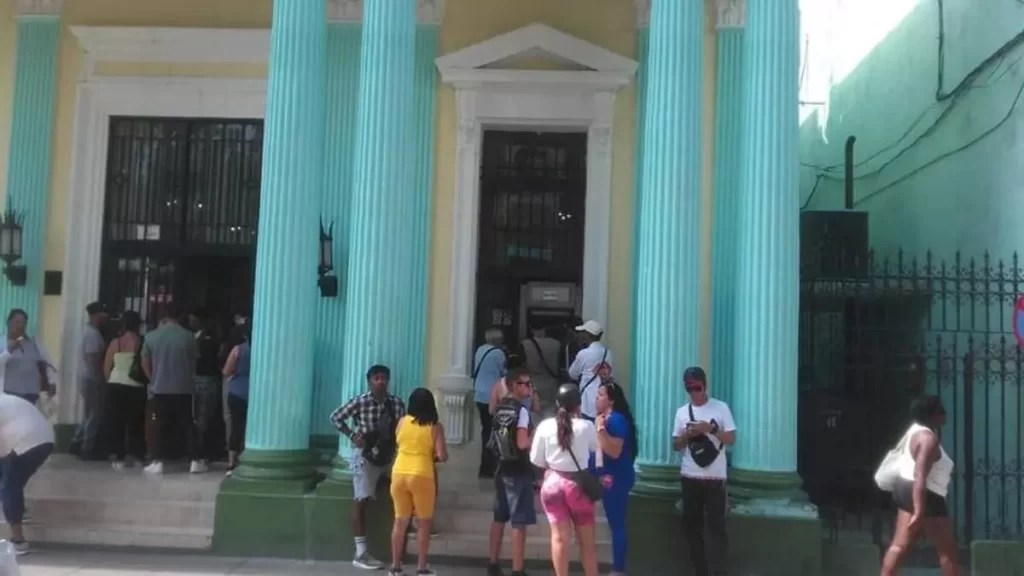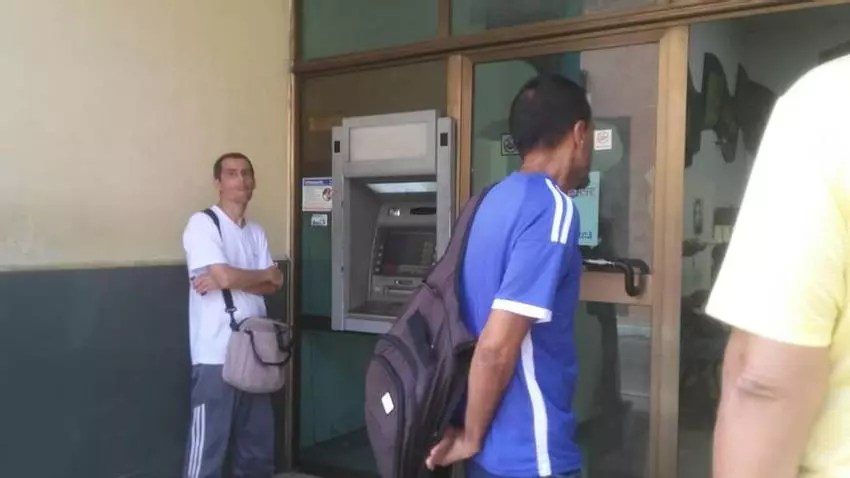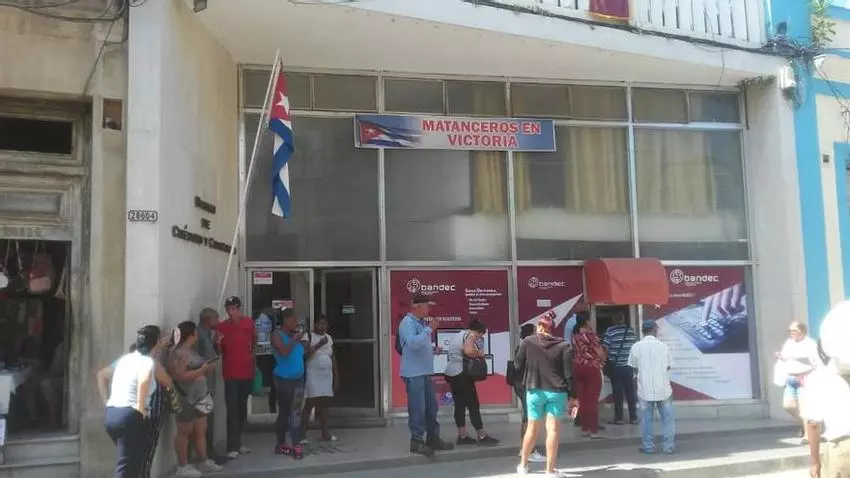In addition to the limited availability of cash, customers complain about the long hours of waiting, not understanding the working hours, fatigue and hunger

![]() 14ymedio, Julio César Contreras, Matanzas, May 5, 2024 — Getting up early in the morning, making a coffee and leaving for the Banco Popular de Ahorro on Calle Medio, in Matanzas, has become a routine that Magda repeats between three and four times a month. Before 5:00 am, the 47-year-old is already at the branch standing in line to withdraw money from the ATM. The entity, however, does not open its doors until three and a half hours later.
14ymedio, Julio César Contreras, Matanzas, May 5, 2024 — Getting up early in the morning, making a coffee and leaving for the Banco Popular de Ahorro on Calle Medio, in Matanzas, has become a routine that Magda repeats between three and four times a month. Before 5:00 am, the 47-year-old is already at the branch standing in line to withdraw money from the ATM. The entity, however, does not open its doors until three and a half hours later.
“When I have to come to withdraw money I always arrive very early, but it doesn’t matter when I get up, there are always people there: coleros* [people being paid to stand in line for someone else] or people who are willing to wait from earlier,” Magda tells 14ymedio. “I immediately sit on the stairs and wait.”
Magda lives near the bank, but customers from several miles away walk to that branch from, for example, Peñas Altas. As she explains, arriving early does not guarantee that she can withdraw what she wants. “When the bank opens, the coleros have already left and those who hired them arrive – sometimes more than one – and replace them. By the time you arrive, the number of people in front of you has doubled,” she says. “The other thing is that this bank doesn’t always have money and coming here is a game of chance.”

At 8:30 am a branch worker opens the doors to the anxious crowd and repeats his speech of every morning: “Soon money will be put in the ATM; each customer will be able to extract only 10,000 pesos and insert a maximum of two cards. Keep the line organized,” he warns.
With the wait for the money, the discomfort begins. “None of those people were here at 7:00 am, when I arrived,” a woman complains. “Oh, daughter, don’t you realize that that man made a line for them? Everything here is fixed,” another replies.
In addition to the low availability of cash, customers complain about the long hours of waiting, the working hours, fatigue and hunger. “I already warned them at work that I was going to be late. The boss will scold me again, but there is no remedy. If they want us to be early, then don’t pay us by card,” grumbles a young office worker.
With the difficulty of the task, Cubans have devised several “tricks” to extract the money or do it faster. “That man there came early with his wife, and she went to another ATM in case the cash runs out here,” says Magda. Others, she says, have contacts in several banks and call to find out if they will have cash. “I myself have a friend at the ATM of El Naranjal, who told me that today there would be no cash there, nor in the ATMs of the funeral home and Contreras Street,” she says.

“The problem is that, with inflation, anything you buy costs 1,000 pesos, and therefore you need to take large amounts out of the bank. That’s what they charge, for example, the coleros, but I can’t give them that pleasure. Anyway, at 10,000 pesos per head, there are times when the first five people clean out the cash,” she says.
The hours pass slowly and the line doesn’t seem to move forward. “Who is the last of the disabled?” asks a woman without any visible disability. Immediately, suspicion in the line skyrockets. “Right now two people from a private business passed by and took out a lot of large bills. Now you appear with a physical disability. When we get to the front of the line, the money is gone, and those of us who have been here since early morning are left without anything,” a man growls at the indifferent gaze of a woman, who inserts her card into the ATM.
The same employee who hours before gave instructions to the customers now leaves, looks at the line and enters the branch again without saying a word. “Is the money going to run out?” The question makes everyone’s hair stand on end. “It not even ten,” says an old man.

“There’s a lot of banking and everything, but nowhere do they accept payment by transfer. The other day I needed to urgently buy some medication and I had to go to Varadero to get money,” complains a young man.
“Who is the last one?”** asks a man who arrives by bicycle, but there is no answer. The young office employee, whose turn had now arrived and who was extracting cash, gives the bad news: “There’s no more money. I could only get 2,500.” Many of the clients get annoyed and begin to protest, but most, for whom that situation is routine, pick up their things and leave. It’s 10:30 in the morning.
The employees of the branch don’t say a word. Only the custodian of the bank clarifies the doubt – otherwise well known – to an old woman: “They won’t put in one more peso until tomorrow.”
Translator’s notes:
*A line or queue in Cuba is called a ‘cola’ (literally ‘tail’) and ‘coleros’ are people who others pay to hold their place in lines that can be hours, or even days, long.
**Each person who joins the line asks “who is last” and then they themselves become the new “last person” until the next arrival. In this way Cubans don’t have to stand strictly one-behind-the-other, and can still maintain their positions in the line.
Translated by Regina Anavy
____________
COLLABORATE WITH OUR WORK: The 14ymedio team is committed to practicing serious journalism that reflects Cuba’s reality in all its depth. Thank you for joining us on this long journey. We invite you to continue supporting us by becoming a member of 14ymedio now. Together we can continue transforming journalism in Cuba.
